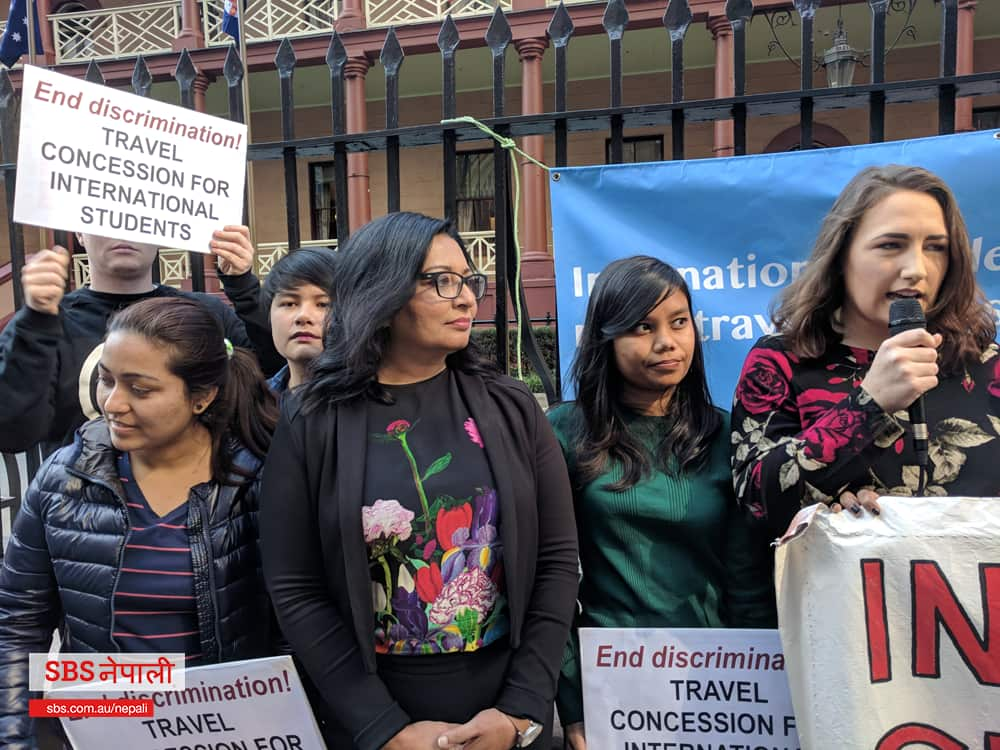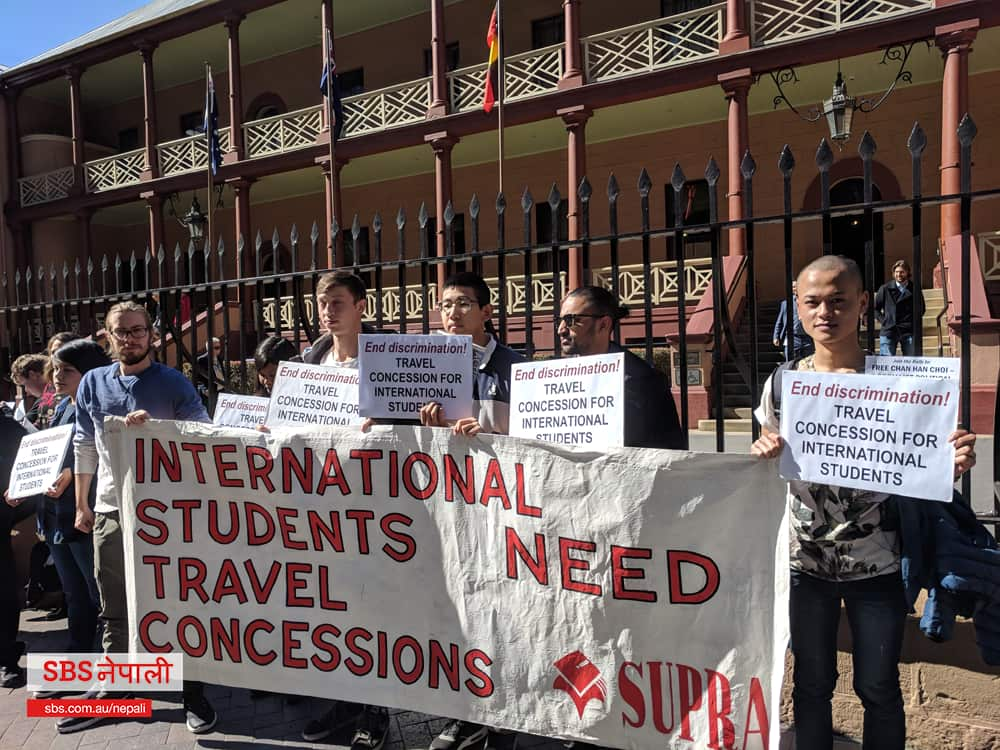Kapil, a young Nepali student, currently undertaking a degree in Information Technology in Sydney, says he had never been to a protest event before in Australia.
That changed this week when he stood in solidarity with other fellow international students in front of the New South Wales Parliament House in Macquarie Street in Sydney's CBD. They were calling for the state government to fall in line with other states and allow international students to be eligible for travel concessions on public transport.
"International students are temporary residents paying state/territory, GST and income taxes in the same way as their domestic counterparts, and the same arguments regarding costs of access to study apply with the same force."
Kapil was joined by fellow Nepalis as well as students from many countries including Indonesia, Bangladesh, India and the United States, as well as Australian born students and representatives from university students organisations.
Many told SBS Nepali that they spend on average about $20 per day on transport.
“We could spend that money on food, accommodation and fees”, said one student. "If we could save about $120 a month on transport – we can use that to buy educational materials.”
“There have been so many occasions when we couldn’t go to work because we didn’t have money left on the opal card – having to wait for the pay date to top up the money can be very hard”, said Kapil.
'Indicative of racism'

Indian student Geena George has a similar experience too.
As part of her Community Service degree, Ms George must complete thousand hours of placement. She says she’s spending at least $50 per week to get to her placement.
“This is socially excluding for me because I can’t afford to do any other activities after paying for transport”.
"There are around 300,000 international students in New South Wales - that's around 40 per cent of the total international student population in Australia. Countries such as China, India and Nepal are the largest source countries - no joke - that's what we're called. So I feel that's indicative of racism."
“This is socially excluding for me because I can’t afford to do any other activities after paying for transport”.
Other students accuse the government of giving with one hand and taking away from the other.
“Welcome to Australia, you can study with us – but we’ll charge you high university fees and lack of access to concession cards and reducing rights to get a part-time job,” one international student told SBS Nepali.

'Cynical reality of NSW politics'
Currently, all states except New South Wales provide transport concessions for international students.
But it's an issue that is not new.
Jenny Leong is the Greens MP in the New South Wales parliament representing the electorate of Newtown which includes the University of Sydney.
Before joining the state politics, Ms Leong had taken the issue to the state's Administrative Decisions Tribunal in her previous role as President of the Sydney University Postgraduate Representative Association (SUPRA).
“The tribunal found it was discrimination not to provide concession to students”, Ms Leong says.
“After the decision, we thought the campaign was won, but the reality was the NSW parliament changed the law to continue charging full fare to international students”.
The Greens MP accuses both the Liberal and the Labor party of not supporting the issue of transport concessions because international students can’t vote.
“This is the cynical reality of NSW politics”, she told SBS Nepali.

Photo Gallery:
“The New South Wales government is happy to count the fees paid by international students to certain indicators of the state’s economy. But when it comes to providing access to international students on certain things like travel concessions, they’re not willing to stump up”.
“This is something that’s got to change, it’s something that cannot be explained as anything other than a form of discrimination and it must end”, says Jenny Leong.
Citizenship versus residence
A position paper by back in 2007 suggested that denying travel concessions to international students could be 'discriminatory'.
"Transport, unlike voting or social security entitlements, is not a citizenship issue but a residency issue," the paper stated.
"International students are temporary residents paying state/territory, GST and income taxes in the same way as their domestic counterparts, and the same arguments regarding costs of access to study apply with the same force."
Federal v State
SBS Nepali reached out to federal education minister Simon Birmingham for comment but was directed back to the state government. His office did provide, however, an earlier statement on the Council for International Education whose job is to help the minister “address issues” about international education.
Bijay Sapkota, President of the Council for International Students Australia (CISA), the national peak body for international students, was also at the protest event in Macquarie Street.
He said the discrepancy or discrimination around travel concession is a major concern for international students.
“The conversation around student concession is not new – has been going for more than five years”, says Mr Sapkota.
“Our job is to make the parliamentarians aware”, he said, adding that Australia’s reputation as a world leader for international education is at stake.
Petition
A petition signed by more than 1,000 international students was submitted on during Tuesday’s protest event to Greens MP Mehreen Faruqi, on her last day as a state MP.
Ms Faruqi promised to continue raising the issue of transport concession after commencing her new role as a Senator in the Upper House of the federal parliament, replacing her Greens party colleague Lee Rhianon.
$30 billion contribution
In 2017, international students contributed more than $30 billion to Australia’s economy, making it the largest export in the service industry. Students living and studying in New South Wales made the biggest contribution to the economy, adding more than $11 billion to the economy.
According to federal government figures, just over 786,000 students are thought to have enrolled in various educational institutions across Australia last year. More than 35 per cent of those enrolments were in New South Wales.
Within the first three months of 2018, more than half-a-million students from over 190 countries arrived in Australia. Federal education minister Simon Birmingham praised the “record-breaking run” of growth in the number of students coming to the country.
New South Wales Transport Minister and shadow minister’s offices have been contacted for a response.
For more update and stories like this, like us on Facebook and follow us on Twitter
